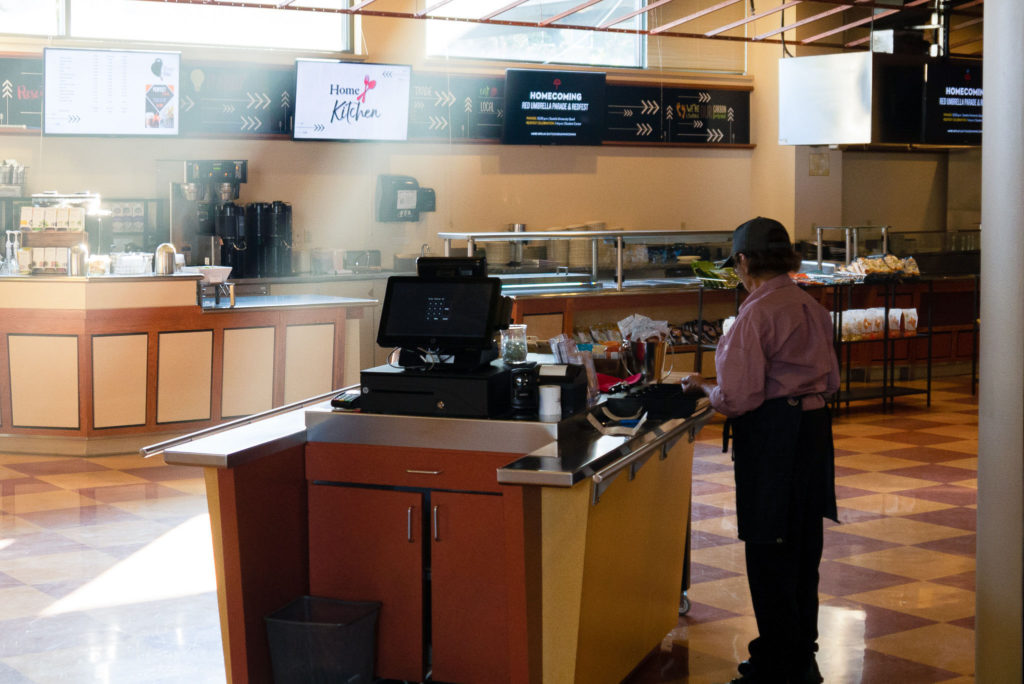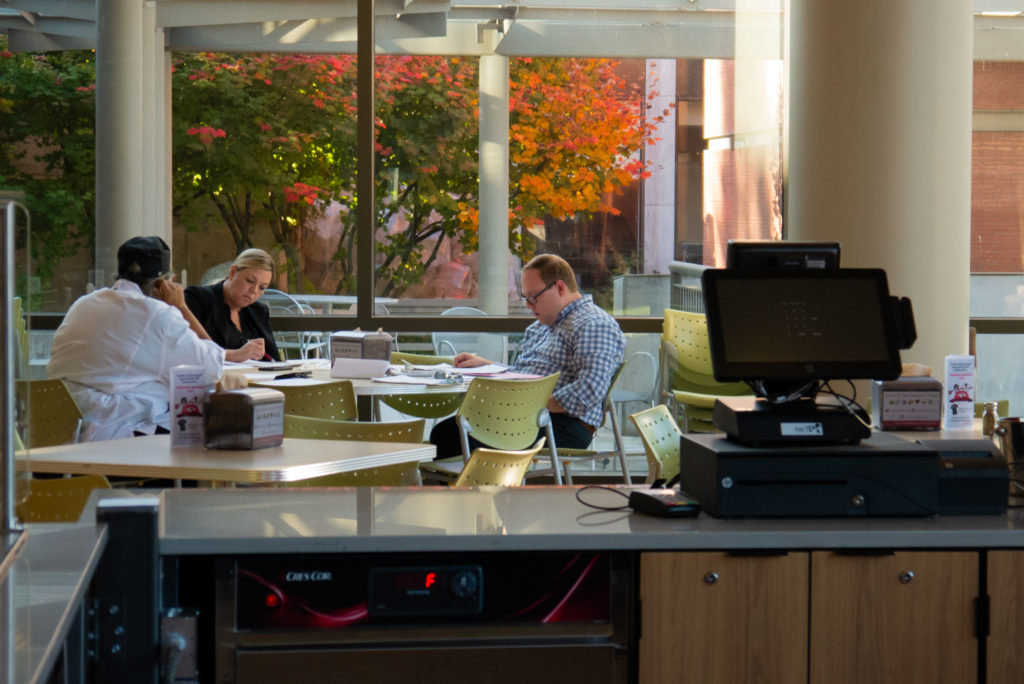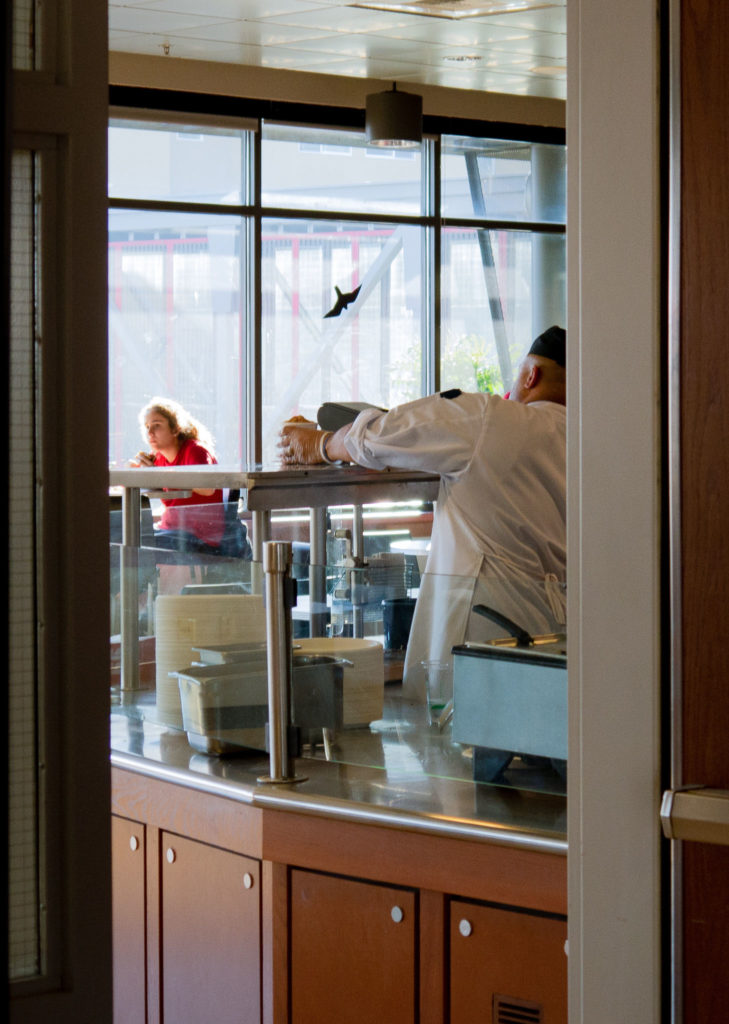Two issues ago, The Spectator ran an article on Chartwells and its transition to Seattle University.
In the article, employees reported incorrect pay stubs, insufficient communication with management, out of stock items, and continual understaffing. Soon after the article was published, more employees have reached out via email to share their experiences. All employees have chosen to remain anonymous.

Chartwells employee working at Cherry Street Market, Seattle U’s primary on-campus eatery.
Three student employees have worked at Seattle U since their first year, which allows them to quickly pick up on the new company’s changes. The lack of communication was an immediate concern. One of the student employees works at Cherry Street, and due to its central location, the employee is more likely to see management than other locations.
“They never respond to their emails even though they tell you that is the best way to communicate with them,” the student employee said.
Although the Cherry Street student worker expressed frustration that their emails never receive responses, they sympathize with the amount of responsibility the managers have to uphold. They believe that the management team’s stressful position brings greater problems to worry about, making it difficult to focus on peripheral concerns—such as emails.
The next student employee also works at Cherry Street, and their primary concern is being overworked and not being able to take breaks or lunches. Typically, a 10 minute break is given for every four hours worked. A 30 minute lunch break is required for any shift that lasts five and a half hours or more.
“I feel like I’ve been doing the job of two people,” they said. “Last night was the first shift since I’ve been back that I did not feel overworked.”
The employee is thinking about transferring to another location that may be better staffed, where they would be able to receive breaks. Currently, they work two out of three shifts a week without a supervisor.
The last student employee is a barista at the Byte. A concern they wanted to address was the lack of staff in other locations. Although they are primarily located at the Byte, they have been told to split their time between other locations.
“They have us running back and forth between the Sidebar and C Street,” they said. “Even if we’re scheduled to work here [at the Byte], one of us will end up going to the Sidebar for about an hour because they don’t have anybody.”
These concerns are not limited to student employees. Supervisors have reported the same problems amongst additional concerns.
One supervisor’s primary concern regarded the mislabeling of food products. They recalled that during the first two weeks of school, there were unlabeled desserts being served with nuts. The supervisor acknowledged that it may have been an error during the transition period, and that the labeling of foods has gotten better.
In addition to the initial lack of allergen warnings, they pointed out that although there are foods labeled vegan or vegetarian, there is a chance that they may have been cross-contaminated. Most recently, there were mashed potatoes being served at Cherry Street which were labeled vegan, but were made with butter and milk.
“If you’re a vegan or vegetarian, you might want to ask a chef how your food was made,” the supervisor said.
As a supervisor, this employee is able to see and understand the daily functions within food service. They stated that there are not enough employees available to efficiently run locations. They have noticed new employees being hired, which they see as a definite step forward, but are still citing issues with employees overworking themselves.
Melissa Flood, who was previously the retail director of Chartwells but is no longer part of the company, was the point of contact for all employees. Employees have reported her behaviour as unprofessional and rude.
“She has a habit of raising her voice,” the supervisor said. “When she isn’t raising her voice, you still leave the conversation feeling extremely disrespected.”
Flood would often change schedules without notifying employees in order to satisfy all food locations with workers, but never notified anyone of these adjustments.
“Most of these schedule changes happen day-to-day instead of giving proper two weeks’ notice,” the supervisor said. “Sometimes you may not even know your schedule was changed. One employee felt that he had no choice but to quit because he was scheduled to work 12 days in a row.”
In light of this, supervisors have been forced to take on the managerial role of scheduling employees and handing those schedules to managers to input into the system. Before the supervisors took on the responsibility, employees would often have to work locations on their own.
Chartwells Division President West, Joseph Fischioni, responded to each of these concerns, expressing his commitment to Seattle U’s community.
Fischioni said Chartwells is committed to providing all employees with management that is ready and equipped to assist them. He commented on Flood’s behaviour towards associates and his belief in creating an environment where associates feel valued.
“Melissa is no longer an employee of Compass Group because that’s not our brand,” Fischioni said.
He relayed that the cause of the payroll issues has been resolved and as of Friday, Oct. 19, the employees have been paid their missing wages.
“I’m happy to report that it’s been fully resolved,” he said. “Every single employee that had hours missed or a week missed has been completely paid in full as of today.”
Fischioni has spoken with his team and as an apology for the pay discrepancies, they are giving $50 gift cards to every employee. The gift cards are from the Chartwells Higher Education’s YouFirst program, which is the associate recognition platform. The gift cards will spend the same as a Visa gift card.
The aforementioned supervisor acknowledged that the gift cards are a nice gesture, but they are still waiting for changes in core day-to-day functions.
“I feel like I’ve been doing the job of two people,” they said. “Last night was the first shift since I’ve been back that I did not feel overworked.”
In response to the labeling of the foods, Fischioni expressed excitement about the new digital screens at Cherry Street and The Bottom Line with food identifiers and icons providing information of the foods.
“Everything is there with the identifiers and icons that are pulled directly from our menu system which identify which foods are vegetarian, vegan, and gluten free,” Fischioni said.
Fischioni also addressed the staffing problems and workers being unable to take breaks. He stated he has spoken with his team to create break schedules. These break schedules would ensure that each employee that has worked the hours needed to receive a break is actually relieved for their break.
In response to the communication issues the employees have bought up, Fischioni addressed the problem in a multi-faceted manner. He explained that the first pillar in their organization is people, and that their employees and the people they serve are their first priority.
“We treat our people with care and concern and that is truly at the heart of our company. The leadership team here, they want our associates to want to come to work.”
Connie Kanter, the Chief Financial Officer at Seattle U, commented on the values of Chartwells, citing their beliefs as an integral part of the process of choosing them as the school’s food provider.
“One of the things with Chartwells that really resonated with us as a university is their values of putting people first,” Kanter said.

Chartwells employees and chefs work just outside Neighborhood Eats in the Student Center.
An associate party will be happening in Neighborhood Eats in Cherry Street on Monday, Oct. 29. Fischioni referred to it as a thank-you party to all associates and employees of Chartwells.
“It’s a celebration for our team members that says, ‘thank you—thank you for helping us get the academic year open as a new company,’” he said. “It’s a bit of a reset. We’re hearing that associates feel as though they’re not being heard and we really want them to know that we care.”
The previously mentioned supervisor said that with Chartwells, they do not feel as if they have the support they need from the new management team. The main concern for them, and for all the employees mentioned, was that they wished that their managers would make themselves available to listen and support the employees.
“This isn’t a personal vendetta,” they said. “We’re not against Chartwells. I want to keep this job, I want to be here.”
Asma may be reached at
agaba@su-spectator.com
















